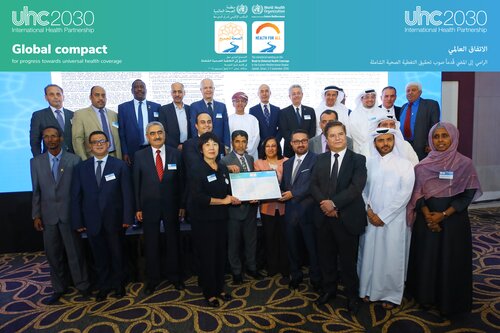Global health leaders and stakeholders gathered in Berlin last...
5 September 2018
On 4 September 2018, 22 countries and territories signed the UHC2030 Global Compact to accelerate progress towards universal health coverage (UHC), marking a significant moment for UHC.

All countries from the Eastern Mediterranean Region (EMRO) collectively approved the UHC2030 Global Compact, demonstrating the depth and breadth of political commitment towards achieving UHC in the region.
Ministers of health and heads of delegations from all 22 countries and territories signed the Global Compact during the ‘Ministerial meeting on the road towards universal health coverage’ in Salalah, Oman from 3-5 September 2018.
“We invited countries of the Region to sign the Global Compact jointly as a sign of regional commitment and solidarity towards UHC. Political will and commitment are essential to secure and sustain investment in health and drive appropriate health systems reforms,” said Dr Ahmed Al-Mandhari, WHO’s Regional Director for EMRO.
The signing of the UHC2030 Global Compact demonstrates the extent of high level commitment to take action to make progress towards UHC by all countries of the Region. It means that signatories and their governments have committed to working together effectively to accelerate progress towards UHC through building equitable, resilient and sustainable health systems and agreed to a set of key principles to guide their action.
These are:
- - Leaving no one behind: a commitment to equity, non-discrimination and a rights-based approach
- - Transparency and accountability for results
- - Evidence-based national health strategies and leadership, with government stewardship to ensure availability, accessibility, acceptability and quality of service delivery
- - Making health systems everybody’s business – with engagement of citizens, communities, civil society and private sector
- - International cooperation based on mutual learning across countries, regardless of development status and progress in achieving and sustaining UHC and development effectiveness principles
In a recorded message to the meeting, Dr Tedros Adhanom Ghebreyesus, WHO’s Director-General, declared that UHC was WHO’s top priority, considering UHC and health security as two sides of the same coin. “Strong health systems, built on the foundation of people-centred primary care, are the best investment in reducing inequalities, and the best defence against the impact of emergencies,” the Director-General said.
During technical sessions, participants were briefed on a World Bank analysis of UHC reforms in over 40 countries with a total of 2.6 billion people. Among the lessons that emerged was that all countries regardless of their income status can and should move towards UHC. “A country does not need to be rich to start moving towards UHC,” said Dr Fernando Montenegro Torres, a senior health economist at the World Bank.
UHC2030 warmly welcomes the countries of the EMRO region to the partnership and looks forward to sharing experiences and knowledge around building equitable, resilient and sustainable health systems in order to achieve UHC.
Read the full media brief about the event here.
The countries and territories that signed the UHC2030 Global Compact to accelerate progress towards UHC are:
Afghanistan
Bahrain
Djibouti
Egypt
Islamic Republic of Iran
Iraq
Jordan
Kuwait
Lebanon
Libya
Morocco
Oman
Pakistan
Occupied Palestinian territory
Qatar
Saudi Arabia
Somalia
Sudan
Syrian Arab Republic
Tunisia
United Arab Emirates
Yemen
